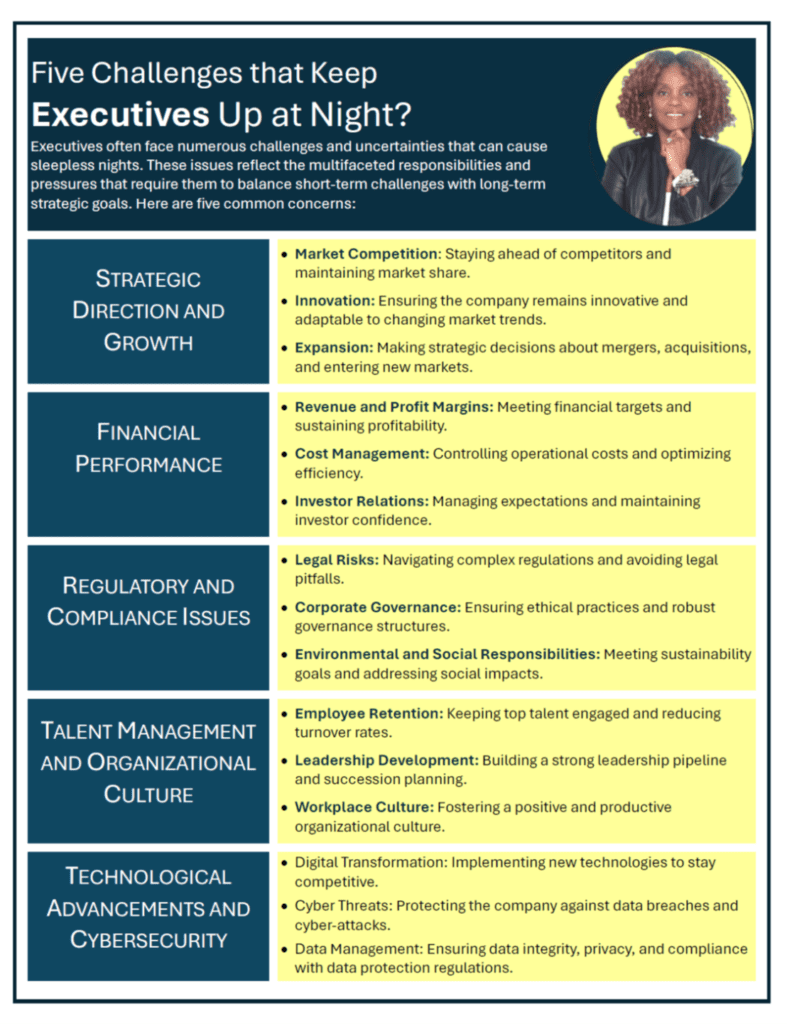
In the high-stakes world of corporate leadership, executives often find themselves wrestling with complex challenges that go beyond day-to-day operations. Here are five key issues that commonly keep executives awake at night, driving them to continually strategize and adapt in an ever-evolving business landscape.
1. STRATEGIC DIRECTION AND GROWTH – At the helm of their organizations, executives are perpetually focused on steering the company towards sustained growth and success. This involves:
Market Competition: Keeping a close eye on competitors and devising strategies to stay ahead. The fear of losing market share to agile or innovative rivals is a constant pressure.
Innovation: Ensuring that the company remains innovative, fostering a culture that encourages creativity and adaptation to new market trends.
Expansion: Making strategic decisions about entering new markets or considering mergers and acquisitions. These decisions carry significant risks but are crucial for growth.
2. FINANCIAL PERFORMANCE – Financial health is the backbone of any successful business, and maintaining it is a primary concern for executives:
Revenue and Profit Margins: Meeting financial targets is essential. Executives constantly monitor revenue streams and work to enhance profitability.
Cost Management: Keeping operational costs in check while striving for efficiency and productivity.
Investor Relations: Managing investor expectations and maintaining their confidence is critical. Any sign of financial instability can lead to investor unrest.
3. REGULATORY AND COMPLIANCE ISSUES – Navigating the complex landscape of regulations and compliance is a significant concern:
Legal Risks: Avoiding legal pitfalls and ensuring that the company adheres to all relevant laws and regulations.
Corporate Governance: Upholding strong governance practices to ensure ethical conduct and accountability within the organization.
Environmental and Social Responsibilities: Addressing sustainability goals and the social impact of business operations is increasingly important in today’s corporate environment.
4. TALENT MANAGEMENT AND ORGANIZATIONAL CULTURE – The success of a company heavily depends on its people and the culture they operate within:
Employee Retention: Keeping top talent engaged and reducing turnover rates is a continual challenge. High employee turnover can disrupt operations and affect morale.
Leadership Development: Building a robust leadership pipeline and ensuring effective succession planning is vital for long-term stability.
Workplace Culture: Fostering a positive, inclusive, and productive workplace culture can significantly impact employee satisfaction and performance.
5. TECHNOLOGICAL ADVANCEMENTS AND CYBERSECURITY – In an age of rapid technological change, staying ahead is both an opportunity and a challenge:
Digital Transformation: Implementing new technologies to remain competitive and enhance operational efficiency is a major focus.
Cyber Threats: Protecting the company against data breaches and cyber-attacks is a top priority. The increasing sophistication of cyber threats requires constant vigilance and investment in security measures.
Data Management: Ensuring data integrity, privacy, and compliance with data protection regulations is crucial for maintaining trust and operational integrity.
The role of an executive is laden with complexities that extend far beyond the boardroom. Balancing strategic direction, financial health, regulatory compliance, talent management, and technological advancements requires a blend of foresight, adaptability, and unwavering commitment. As these leaders lie awake at night contemplating these challenges, their decisions and actions shape the future trajectory of their organizations.

If you ‘d like a copy of the Leadership Cheat Sheet for this article, or more details about our Executive and Leadership Coaching Programs, contact us at [email protected]. It would be our pleasure to assist!

